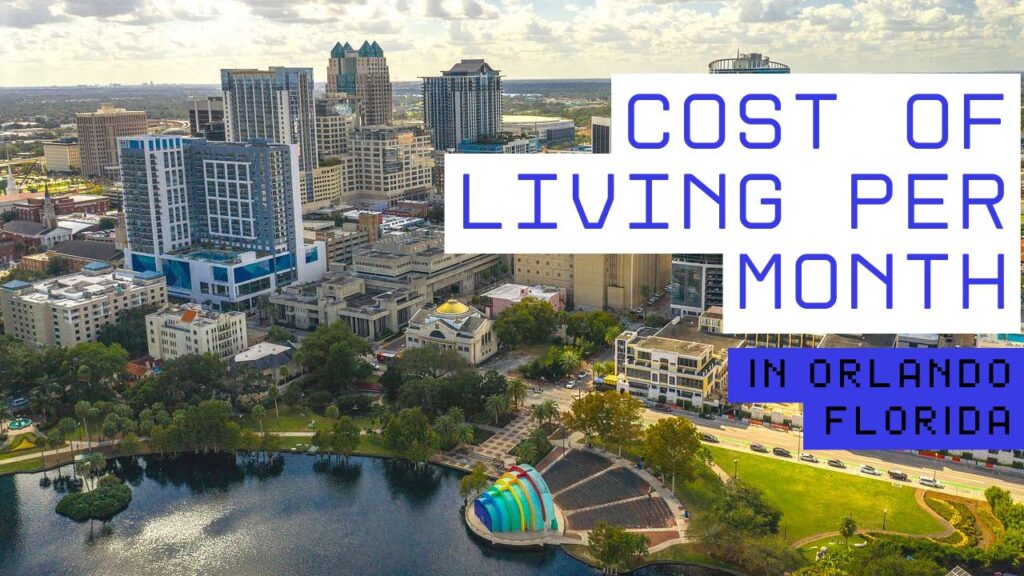Understanding the Cost of Living in Orlando, Florida
Orlando, Florida, is renowned for its theme parks, vibrant lifestyle, and sunny weather. However, the city has seen a notable rise in its cost of living over recent years. If you’re contemplating a move or curious about monthly expenses in Orlando, this comprehensive breakdown will give you a clear perspective.
Monthly Expenses Without Rent
Living in Orlando can be costly, especially when compared to other cities globally. For instance, a family of four can expect to spend around $4,154.60 per month on essential expenses—excluding rent. This figure covers:
- Groceries
- Transportation
- Utilities
- Recreation
For individuals, the monthly expenses average about $1,169.70, not accounting for rent. While this is manageable for those with steady incomes, it leaves little room for savings without meticulous budgeting.
Cost Comparison
Orlando’s living costs are approximately 180% higher than in cities like Pune, India, making it significantly more expensive.
Housing and Rent Costs
Housing is undoubtedly one of Orlando’s largest expenditures. Here’s a breakdown of average rental prices:
- One-bedroom apartment in downtown: $1,707.82/month
- One-bedroom apartment outside downtown: $1,561.71/month
- Three-bedroom apartment in downtown: $2,918.18/month
- Three-bedroom apartment outside downtown: $2,561.19/month
In terms of comparison, renting in Orlando is about 519% more expensive than in Pune, driven by increasing demand and a growing population.
Food and Grocery Prices
Dining out in Orlando can quickly add up. Here’s what to expect:
- Basic meal at a low-end restaurant: $20
- Dinner for two at a mid-range restaurant: $80
Fast food isn’t cheap either:
- McDonald’s combo meal: $11
- Regular cappuccino: $4.95
Grocery Costs
Grocery shopping also hits the wallet hard. Here’s a list of common grocery prices:
- Milk (1 liter): $1.13
- Bread (500g): $3.70
- Rice (1kg): $5.33
- Eggs (12): $4.62
- Chicken (1kg): $11.38
- Beef (1kg): $16.03
- Cheese (1kg): $11.25
Produce prices can be steep as well:
- Apples (1kg): $6.21
- Tomatoes (1kg): $4.03
- Potatoes (1kg): $2.70
- Lettuce (1 head): $2.62
Tip: Grocery expenses can quickly accumulate, costing families a substantial amount each month.
Utilities and Internet
Utility costs are another expense to consider. For a typical apartment, standard utilities run about $202.42/month. High-speed internet (60 Mbps or better) averages around $79.80/month.
Mobile phone plans in Orlando are among the highest globally, averaging $69.44/month for essential service.
Transportation and Gas Costs
While Orlando has public transportation options, many residents rely on personal vehicles:
- One-way bus fare: $2.00
- Monthly transit pass: $50
- Taxi base fare: $2.90
- Taxi per km: $1.90
- Gasoline (1 liter): $0.87
Owning a car can lead to monthly expenses exceeding $400, considering insurance and maintenance.
Child Care and Education Expenses
Childcare costs in Orlando are substantial:
- Private preschool (full day): $1,175/month
- Primary international school: $9,833/year
Additional costs such as books, uniforms, and activities should also be factored in.
Recreation and Lifestyle Costs
While Orlando brims with entertainment options, enjoying these amenities comes with a price tag:
- Fitness club membership: $37.83/month
- Tennis court rental (1 hour): $6.12
- Cinema ticket: $15.00
Alcohol and Tobacco Prices
- Domestic beer (0.5L bottle): $2.26
- Imported beer (0.33L): $2.71
- Bottle of wine: $15.00
- Marlboro cigarettes (20-pack): $8.50
Note: While outdoor parks offer free activities, many paid events require a solid budget.
Clothing and Footwear Costs
Fashion and apparel in Orlando follow national price trends:
- Jeans (Levi’s or similar): $45.25
- Summer dress (chain store): $35.71
- Running shoes (Nike): $83.79
- Men’s business shoes: $110.62
Regular shoppers should anticipate clothing costs exceeding those in many international cities.
Income vs. Cost of Living in Orlando
The average after-tax salary in Orlando is around $4,336.29/month. While this is adequate for an individual, families with one income may find expenses like rent and childcare exceeding their earnings.
With Florida’s minimum wage nearing $14/hour by 2025 and aiming for $15/hour by 2026, keep in mind that not all employers comply, leading to variances in actual wages.
Final Thoughts: Is Orlando Affordable?
Orlando offers a beautiful and lively lifestyle, yet affordability is becoming increasingly challenging. With rising costs related to rent, groceries, utilities, and childcare, budgeting becomes essential for anyone considering relocation.
For established professionals with stable incomes, Orlando can be a favorable living environment. However, for low-income workers, retirees, or families, the financial strain can be considerable.
Before making the move to this vibrant city, it’s crucial to understand and plan for these expenses adequately. For more insights on living in Orlando, check out resources like Numbeo for up-to-date financial comparisons and cost breakdowns.


